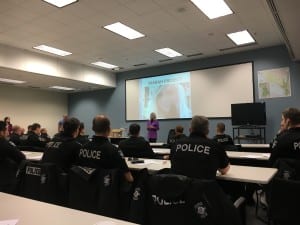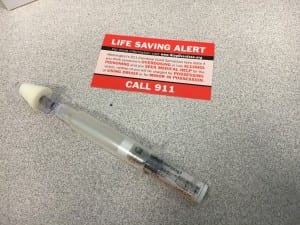
Bike officers to be trained and equipped with Nasal Naloxone
Today the Seattle Police Department, together with The Marah Project and the University of Washington announced an initiative equipping bike officers with Nasal Naloxone (also known as Narcan) in an effort to decrease deaths from opiate overdoses. This program updates dispatch protocols and allows bike officers in the East, West and North precincts to administer Narcan reversing the effects of a heroin or pharmaceutical opioid overdose.
Under the new policy, 60 bike officers will be trained to administer Narcan on scene for a six to eight month initiative. Upon use, officers will monitor the subject until the Seattle Fire Department (SFD) arrives and inform SFD of the Narcan application. The SPD joins a number of departments across the country issuing Narcan.
What makes the SPD program unique is the research aspect. Officers will collect data to support the evaluation of the potential impact of administering naloxone. To date, no research has studied the impact of police officers carrying naloxone on the health of overdose victims — SPD will be the first in the country. Furthermore, Washington State is home to the Good Samaritan Overdose law which encourages people to call 911, should they seek medical help for someone having an overdose, without fear of being charged for having or using a small amount of drugs.
“This program gives our bike patrol officers another tool to save lives and will provide researchers at the University of Washington frontline information to help us understand how we can better respond to this public health crisis,” said Mayor Ed Murray. “The heroin epidemic we’re experiencing impacts us all and we must do more to reach the most at-risk within our community. Today’s announcement would not be possible without Penny LeGate’s tireless advocacy and generosity, bringing awareness and a voice to the hundreds of families that have lost loved ones to heroin and opiate addiction.”
“Our officers provide services every day to people struggling with addiction,” said Chief Kathleen O’Toole. “With Naloxone we hope to save more lives. Our goal is to expand the program department wide. Thank you Penny LeGate for providing the support needed to make this program possible. I would also like to thank the Fire Department especially Chief Scoggins and Dr. Sayre for their continued collaboration as well.”
“This is a momentous development in Seattle’s battle against heroin addiction. I am very grateful to Chief O’Toole for this partnership with the SPD which will definitely help save lives,” said Penny LeGate founder of The Marah Project and member of the recently formed King County Heroin Task Force.
“This is a great opportunity for the public to learn about life saving interventions for opioid overdose. I’m looking forward to partnering to evaluate the outcomes of this pilot to learn how to effectively implement overdose preventions in the future,” said Caleb Banta-Green Senior Research Scientists at the UW’s Alcohol and Drug Abuse Institute and member of the King County Heroin Task Force.
The bike officers who completed training today will receive Narcan kits immediately, subsequent training’s to follow in the East, West and North precincts.



